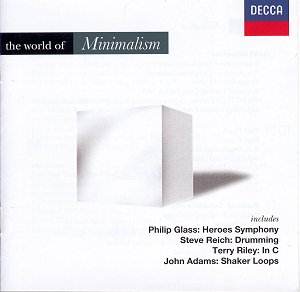Having grown up in New York, I was fortunate to be able to experience the tail end of the minimalist period, at least the end of its growth and development. In the mid- to late-1970s, and early 1980s, minimalism was leaving the galleries and performance spaces and entering the mainstream. Philip Glass's operas were being performed around the world, Steve Reich broke out of the avant-garde mold, and other composers from New York, such as Laurie Anderson, were reaping popular success.
I have been a fan of minimalism ever since my first discovery of Steve Reich's music, around 1976, when I first heard his magnificent Six Pianos, a work that explores a unique relationship of gradually shifting melodies he calls phasing. Over the years, I attended many concerts in small performance spaces and clubs in New York, as well as the Brooklyn Academy of Music, which presented a revival of Philip Glass' masterpiece Einstein on the Beach. Minimalism has always been, for me, one of the most exciting musical movements of the 20th century, and has engendered many interesting composers. This disc contains a selection of works from composers who have recorded for Decca.
There is a problem with the label "minimalist" being applied to such a wide variety of composers and works. Philip Glass is indeed one of the seminal minimalists, yet the work featured here, V2 Schneider, from the Heroes Symphony, sounds more like standard film soundtrack music. There are certainly some of Glass' signature riffs and sounds, but this is far from being one of his best works.
Steve Reich's Drumming is one of the founding works of minimalism. Its performance can range from less than an hour to over 90 minutes, and features a group of musicians playing a variety of percussion instruments with varying phase effects. In four parts, this work involves the musicians moving to different instruments as the piece progresses. It is as interesting a work visually, when performed, as musically. Unfortunately, the short excerpt here is not enough to truly appreciate the cumulative effect this repetitive music has on the listener. One of the most unique things one notices after a live performance of this work is the power the few seconds of silence, just after the piece is over, takes on. Before the audience applauds, one sits in a limbo where the complex rhythms built up over such a long period of time crumble into the rhythms of silence.
Robert Moran's Points of Departure is another of these so-called minimal works that sounds like a film score. It is barely "minimal", in the sense of being repetitive, and lacks any real interest.
Frame, by Graham Fitkin, is an annoying piece that sounds like the demos you get when you press the wrong button on a cheap electric keyboard in a department store. This is partly due to the keyboard sound on this recording; with different instruments it might be more attractive.
John Adams is one of the most interesting minimal composers. His Shaker Loops (this CD features a section of this work, called Shaking and trembling), is a subtle exploration of rhythm and micro-melodies, somewhat similar to some of Glass' early works. Adams has followed a direction closer to that of Steve Reich, in maintaining a focus on rhythm, yet adding more melodic elements to his music. This excerpt gives a good idea of his music, yet he is still a very diverse composer.
Michael Nyman began his musical career as an avant-garde musician, not so much minimalist as outside the mainstream. With influences from rock, jazz and classical music, he has forged a unique style and sound. He records most of his music himself, with his band, rather than some of the composers on this disc whose music is recorded by orchestras (in the same way that Glass and Reich did for a long time). Some of his earliest works were soundtracks for films by Peter Greenway, as is this piece, from the film, The Cook, the Thief, his Wife & her Lover. Nyman's signature neo-baroque sound can be heard here, the same style that thrust him into the mainstream for his score to The Draughtsman's Contract.
The high point of this disc is the recording of In C, which is undoubtedly the founding work of minimalism. Written by Terry Riley, and first performed in 1965, this work is unique in its structure (it is made up of a series of short phrases) and its performance (the musicians play these phrases as many or as few times as they wish, within certain limits). This work can be played on any instruments, and this recording on a group of keyboard instruments, from the album Piano Circus, is one of the most interesting, if also one of the shortest (the piece can have practically any duration). Note that the Piano Circus album also contains Steve Reich's Six Pianos, which is, perhaps, the composer's most interesting work.
As always, this sort of sampler album has strengths and weaknesses. It allows you to discover works and composers you may not know, yet not all it contains will interest you (of course, this is a question of taste). This disc contains some fine works, especially the performance of In C, which, at 20 minutes, makes it worth having. (Although, if you are familiar with the work, go out and get the Piano Circus album, with Reich's Six Pianos as well).
Kirk McElhearn
